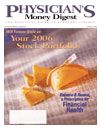Ease the Burden of Financing Real Estate
The process of applying for a home mortgagecan be a challenge for anyone, and physiciansare no exception. Recent data from the AMAconfirms that more than 60% of physicians are self-employed,suggesting that many own businesses orare in private practices where sources of income maybe hard to document. Furthermore, random on-callshifts, sporadic hours, and late nights make time avaluable commodity. With home mortgage interestrates still at attractive levels, physicians should considerunique financing options that cater to busy individualsand those with complex financial situations.
It All Makes Cents
Dr. Daniel Rubano, a self-employed physician livingin Los Angeles, Calif, decided to purchase property inthe state of Washington, but did not have all of the necessarypaperwork to apply for a home mortgage. As aresult of the many hours devoted to his practice, Dr.Rubano was not able to file his taxes by the April 15deadline. Instead, he was forced to file for an extension,leaving him without a current tax return, a documenttypically required for the application process.
There is no doubt that medical professionals suchas Dr. Rubano understand the value of investing inreal estate. Many see real estate as part of a balancedfinancial portfolio, and not simply another expense ormonthly payment. According to recent data from theUS Bureau of Labor Statistics, the median earnings fora physician are approximately $125,000, comparedwith $55,000, the median earnings for a typical professionalwith an advanced degree. Physicians canalso invest more money into their homes and otherproperties, further diversifying their portfolio.
Keeping It Simple
Most financial institutions recognize that each medicalprofessional has unique needs, and many of themfall outside the realm of traditional home financing.There is no longer a one-size-fits-all approach, butrather a variety of finance tools are available to meetthe unique needs of a potential homeowner.
One financial tool designed for physicians withlimited time or undocumented sources of income is a"no doc"or "express"mortgage, which minimizesthe complexity of the home mortgage process. Theseloans require applicants to simply state income andassets usually without supplying required documentationand verifications. An employment history, currentincome, and assets are all that you need for themortgage application, making the process well-suitedto time-crunched physicians. There is no need totrack down W-2 forms, a list of creditors, old taxreturns, or investment records.
Even though Dr. Rubano's schedule prevented himfrom completing his tax return to secure the necessarypaperwork, he was able to purchase a homeusing a no doc mortgage. While a mortgage productin this category was well suited to Dr. Rubano, everysituation is unique. Physicians should consult a financialadvisor or mortgage consultant for more informationabout mortgage financing.
is executive vice president, national consumer lending
sales, for Wells Fargo Home Mortgage. He earned a bachelor's
degree in politics from the University of Maryland. As an active
member of the Mortgage Bankers Association of Metropolitan
Washington, DC, Rogers has held several leadership positions,
including president and chairman of the organization. He welcomes questions or
comments at joe.rogers@wellsfargo.com.
Joe Rogers
